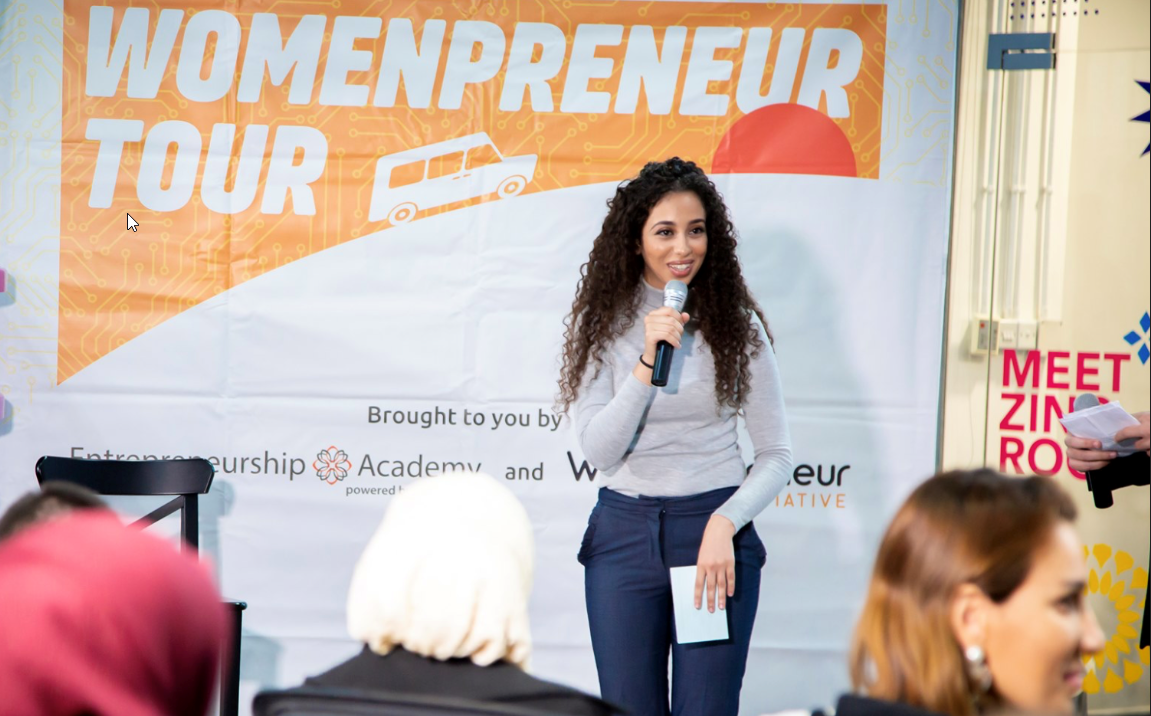

“If you want to kill the evil, look at its roots, not its branches”
06 July 2020 Lucia Conti

by Lucia Conti
Sana Afouaiz is a public speaker on global feminism and an expert on women’s issues in the Middle East and North Africa (MENA) region.
In 2016, she founded Womenpreneur-Initiative, an organization that aims to advance women’s position in the entrepreneurial scene, technology, and innovation.
For the past five years, she has advised the United Nations, the European Commission, corporate institutions, and organizations on gender issues, and in July 2020, she will be a role model speaker in the Spotlight Session of the United Nations Industrial Development Organization (UNIDO) international online conference, “Women in Industry and Innovation”.
Sana Afouaiz was born and grew up in Morocco and she started caring about gender equality at a very young age. She was a pre-teen when she first got interested in feminist books and started writing short paragraphs about inspiring women on the school magazine.
Now she is 26 and her commitment is stronger than ever.
“I do face discrimination daily, like most women” she says, “For instance, I’m quite outspoken, and sometimes I have been told that, as a woman, it is better not to be”.
But for Afouaiz discrimination doesn’t only occur when women are penalized for being assertive, it is also a major issue in the workplace.
“When I am presenting a project to be sponsored and people ask me personal questions, like my marital status, that’s discrimination. And it was discrimination when I started my organization and many possible investors asked me whether I had a male co-founder”.


Since Womenpreneur is a women-only initiative, such question might sound odd, but it is representative of this issue.
Womenpreneur was launched in 2016, and its mission is to support female entrepreneurs and try to make sure that their needs and voices are heard, especially by decision-makers. Womenpreneur’s website states it has a community of 10,000 women across 20 countries.
It was not easy for Afouaiz to achieve this. On multiple occasions, she has heard criticism of women-only spaces and networks, based on one argument, namely that funding women-only projects wouldn’t be fair, because “if we want to fight inequality we need to fund everyone”. But Afouaiz believes it to be a historical injustice against women, “who have been excluded from everything since the existence of homo-sapiens began”. Therefore, she is convinced that women must have and develop their own safe spaces to understand the implications of gender inequality, before they can integrate into a male-dominated ecosystem.
In 2019, Womenpreneur went on tour to map the female entrepreneurial talents of Morocco, Tunisia, and Jordan, and a second tour should hit the road by the end of October, reaching Egypt, Algeria, and Lebanon.
During the first tour, Afouaiz travelled to different cities and met many female tech entrepreneurs, who have developed and funded interesting companies. Some on were the verge of leaving their countries to seek opportunities abroad, others had resisted for many years before their start-ups became successful. All of them had had to struggle.
At the moment, she is supporting women entrepreneurs from the MENA region during the coronavirus pandemic. And she is encouraging women to develop tech skills to access new opportunities and take advantage of the Digital Revolution.
Among other initiatives, a programme dedicated to helping them cope with the crisis was finalized recently and is set to be implemented in Algeria, Egypt and Lebanon.
Afouaiz’s future plans include pushing Womenpreneur further with more projects and keeping up support for women-led businesses, because: “the best way to support female entrepreneurs is to support their projects financially”.
But of course, she also wants to keep on advocating for gender equality and underlines that it is time for a change in mind-set.
She believes that, as long as the perception of women is shaped by a deep-rooted conservative attitude, it will always influence women’s access to opportunities and investments. In her own words, “It is a very important issue to tackle because I believe if you want to kill the evil, you should look at its roots, not its branches”.
In her opinion, UNIDO has the power to impact women’s life positively by raising awareness around those issues. And UNIDO can also play a major role in terms of advocacy, making sure that the countries in the region and its decision-making institutions have a full understanding of how to put appropriate gender strategies into place.
To all the women who will be listening to her, she addresses this message: “I would say: be unapologetic and never settle for a ‘no’”.